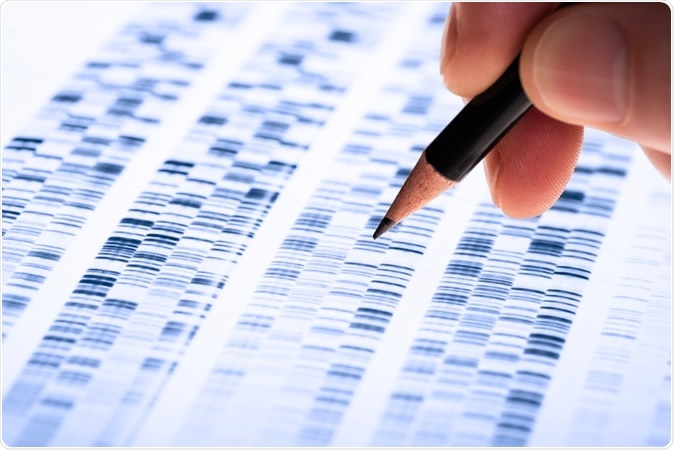Non-coding DNA, junk DNA, genetic dark matter – these are all names for the 98% of DNA that doesn’t directly code for proteins but is crucial in regulating protein synthesis. This is now the focus of a large new study published in the journal Nature Genetics.

Image Credit: Gopixa / Shutterstock
Genes are expressed based on the cell’s microenvironment as well as the whole body environment. This is achieved by multiple regulatory factors, affecting both protein quantity and quality. Much of this modulation occurs via RNA production. Thus an aberration of RNA regulation could seriously affect gene expression. For instance, RNA regulation affects the brain’s response to stroke, and could also be instrumental in the causation of autism spectrum disorder (ASD).
DNA is a large molecule found only inside the cell’s nucleus. On the other hand, RNA is a smaller and far more mobile molecule. One type of RNA is messenger RNA (mRNA). In the brain, mRNAs occur at synapses, or neuronal connections, and are the basis of protein production from the DNA code. These proteins are involved in brain signaling. However, this production process, called translation, is also affected by microRNAs, another category of RNAs, which can cause rapid up- or downregulation of gene expression in reaction to changing conditions within the brain.
One recent study by Robert Darnell, published in the journal Cell Reports, involved following up the activity of microRNAs in a mouse brain after a simulated stroke. They used crosslinking immunoprecipitation (CLIP) to trace microRNA activity, and found that one type called miR-29 showed a steep drop during a stroke. Since miR-29 inhibits two proteins, namely, GLT-1 and aquaporin, these proteins are found at higher levels in these subjects.
GLT-1 functions to remove excessive glutamate from the brain during stroke to limit brain damage, and therefore higher levels help speed up recovery from stroke. Aquaporin levels are, however, directly linked to brain swelling and its increase could therefore worsen brain injury during a stroke. Thus more research is needed to help understand the dual role of a drop in miR-29 in this situation, and to help evolve better treatments for these processes.
Darnell says, “This research suggests potential drug targets for treating stroke. By artificially inducing more GLT-1 mRNA with a drug, for example, you could regulate the amount of glutamate that's getting sucked up and reduce damage to the brain.”
Another study focused on DNA mutations in non-coding regions of the genome. The reason for this is that mutations in coding genes, which cause dysfunctional proteins to be produced, account for only a small fraction of conditions. Thus looking for a genetic basis of complex disorders like ASD and seizure disorders is often unrewarding and confusing. For instance, there is a host of coding mutations associated with these diseases, but they contribute to only about a third of these cases. Thus the answer may lie in regulatory gene mutants rather than coding DNA changes. This could help explain why these disorders appear to have such unconventional transmission patterns.
Darnell comments, “Some conditions have a genetic component, but they don't come with simple family trees where you can predict the chance of a child having a disease based on the parents' genetic makeup. So you need a different approach to figure out which types of mutations are underlying the disease.”
To do this, Darnell’s team looked at the family tree of almost 1,800 microfamilies, each consisting of a father and mother, and two children, one with and one without ASD. The DNA of each family was analyzed. A special deep-learning algorithm was then developed to find genetic differences from affected children compared with other family members. This helped discover how different genetic variants produce specific regulatory effects and negative consequences. In other words, mutations arising de novo in noncoding DNA in the affected children, at both transcriptional and post-transcriptional level, had a much greater impact on normal function than mutations existing in other family members. These seem to be involved in nerve impulse transmission and in the development of neurons. Thus both coding and noncoding mutations contribute to ASD.
The study indicates the possibility that a study of noncoding mutations will help understand such complex disorders more clearly. In Darnell’s words, “This genetic dark matter can fill in our understanding of diseases that coding mutations can't explain.”
Journal reference:
Whole-genome deep-learning analysis identifies contribution of noncoding mutations to autism risk
Jian Zhou, Christopher Y. Park, Chandra L. Theesfeld, Aaron K. Wong, Yuan Yuan, Claudia Scheckel, John J. Fak, Julien Funk, Kevin Yao, Yoko Tajima, Alan Packer, Robert B. Darnell & Olga G. Troyanskaya, Nature Genetics, volume 51, pages973–980 (2019), https://www.nature.com/articles/s41588-019-0420-0